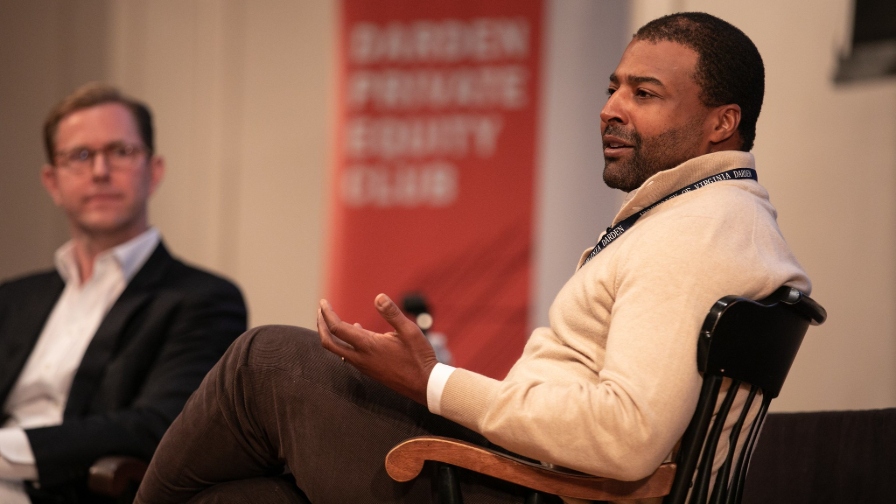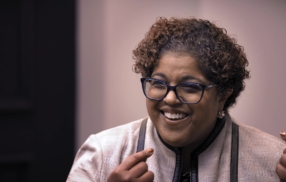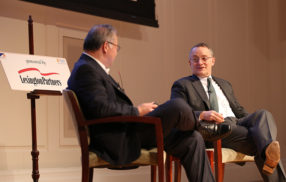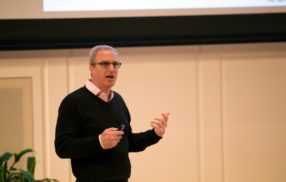
Private Equity Finding Value in Yesterday’s Tech ‘Shiny Objects:’ UVA Darden Private Equity Conference
By Dave Hendrick
When the public markets begin to see once splashy technology companies as dinosaurs, Siris Capital Group Managing Partner Frank Baker starts to take a closer look.
Keynoting the 2019 Darden Private Equity Conference at the University of Virginia Darden School of Business, Baker explained the strategy behind the success of the firm, which raised $3.45 billion for its fourth fund in March.
When public interest in the technology and telecom space moves on to the latest “shiny object,” many legacy companies fall out of favor with analysts and investors, often making them compelling value propositions, Baker said.
For instance, if a telecom company isn’t promoting itself as a software-as-a-service (SAAS) business or as cloud-based, “the public markets will leave you for dead,” Baker said.
“Every tech company goes through these life cycles,” said Baker, who was interviewed by Private Advisors President and Head of Private Equity Chris Stringer (MBA ‘01). “At some point, your technology becomes mature, and then ‘legacy.’”
In the technology world, where the obsession is always what’s news and what’s next, no one wants to hear about a legacy business, Baker said. And yet, even as once-hot companies invest in new startups to try to remain relevant, the legacy businesses are often where the free cash flow is derived, Baker said.
IBM has scores of businesses at every stage of the technology life cycle, but the mainframe computer consoles it has produced for generations remain a revenue driver, Baker said.
“At Siris, we are basically looking at smaller versions of IBM to take private,” Baker said. “We are buying businesses that aren’t sexy, but we are paying six to eight times EBITDA.”
The Siris co-founder, who had stints at SAC Capital Advisors and Ripplewood Holdings under his belt before launching the company in 2006, said Siris looks for a monopoly-like position charging monopoly-like rates.
The ideal company has a legacy business that continues to generate cash flow — which Baker likened to bonds — alongside emerging ventures, which Baker likened to call options.
“Yes, we are tech investors, but we are buying cash cow bonds plus some venture aspects, where if they work, they turbocharge the business,” Baker said.
The investor used the recent example of the video telecom hardware company Polycom, which Siris purchased in 2016. A competitor had recently filed for bankruptcy, and sentiment around the space had turned decidedly negative.
“By the time we got there, all the easy customers had migrated, and what was left was a stable, highly lucrative business,” Baker said. “What the world missed is you can’t forget the importance of hardware.”
Deep Well of Darden Alumni in Private Equity Offer Insights
The private equity conference, which is produced by students in the Darden Private Equity Club, came against a backdrop of continued growth in the sector, which recently capped another strong year of returns and record capital raised. Experts in a variety of sectors — many of them Darden alumni — dissected the state of the market from multiple angles, from venture capital investing to private equity in real estate to the industry’s ongoing diversity challenges.
One trend that remains a perennial focus of recent years: the continued rise of value generation through operational enhancement, as opposed to financial engineering.
At a panel featuring experts with a deep well of operational experience, Bill Stone (MBA ’98), CEO of Mountain Lumber Co., said the specialized industry expertise on display at the conference stood in stark contrast to private equity’s early days, when the industry was synonymous with sector-agnostic leveraged buyouts.
“Unless you weren’t good, it wasn’t that hard for a while,” said Stone, whose company is backed by Axel Johnson Inc. “Then, other people said, ‘Hey, we can do this, too.’”
Sector-based operational expertise has become a necessary differentiator, he said.
Marc Pacala, an operating adviser for Oak Hill Capital Partners, New Spring Capital and Blue Mountain Capital, said he plays an “interpreter role” in the private equity ecosystem, helping management teams understand what their private equity backers are thinking and vice versa.
“There is this intermediary, facilitation role, which is subtle but important,” said Pacala.
Pacala encouraged students interested in the field to try to come up through an operating track, learn how to meet payroll and put a budget together within a sector of interest.
Stone, who worked at Bain & Co. after Darden, said consulting, too, offered a potential path into the field.
“Do consulting and try to get a focus on something,” Stone said of his advice to would-be private equity operators. “Get a couple of years, learn something and know something about something, and go find the private equity out there that deals in the particular something and see if you can come in as an operator.”
There is always a market for smart people who can credibly advise on how to better run a business, Stone said.
Video Highlights
How Industry Changes Are Impacting Private Equity Today
What Keeps The Riverstone Company’s Peggy Roberts Up at Night
Mountain Lumber CEO Bill Stone Sees BizOps Fundamentals as Key to Private Equity Success
The University of Virginia Darden School of Business prepares responsible global leaders through unparalleled transformational learning experiences. Darden’s graduate degree programs (MBA, MSBA and Ph.D.) and Executive Education & Lifelong Learning programs offered by the Darden School Foundation set the stage for a lifetime of career advancement and impact. Darden’s top-ranked faculty, renowned for teaching excellence, inspires and shapes modern business leadership worldwide through research, thought leadership and business publishing. Darden has Grounds in Charlottesville, Virginia, and the Washington, D.C., area and a global community that includes 18,000 alumni in 90 countries. Darden was established in 1955 at the University of Virginia, a top public university founded by Thomas Jefferson in 1819 in Charlottesville, Virginia.
Press Contact
Molly Mitchell
Senior Associate Director, Editorial and Media Relations
Darden School of Business
University of Virginia
MitchellM@darden.virginia.edu







